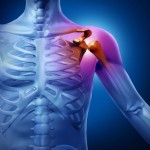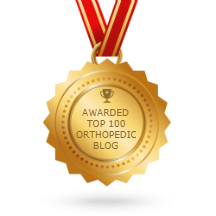 The shoulder is a ball and socket joint allowing for the mobility of your arm. The rotator cuff, which is comprised of a group of four tendons and muscles covering the shoulder joint, helps keep your upper arm bone in your shoulder’s socket. When an injury has caused a tear to the rotator cuff, you are likely to experience pain and immobility.
The shoulder is a ball and socket joint allowing for the mobility of your arm. The rotator cuff, which is comprised of a group of four tendons and muscles covering the shoulder joint, helps keep your upper arm bone in your shoulder’s socket. When an injury has caused a tear to the rotator cuff, you are likely to experience pain and immobility.
Rotator Cuff Pain
Rotator cuff pain is accompanied by difficulty lifting your arm and using it normally. It is important to have your shoulder examined by an orthopedic surgeon to confirm whether a tear has occurred. Surgery may be required to relieve your pain and return you arm’s mobility.
Initial Appointment for Rotator Cuff Pain
During your first appointment, your orthopedic surgeon will examine your shoulder and observe your ability to move your arm in various directions. He will ask which movements are causing you pain to help pinpoint where the injury has occurred. The surgeon will usually order one or more diagnostic tests, including:
- X-rays of your shoulder, including special views
- MRI
- Arthrogram with an X-ray or MRI where dye is injected into the shoulder joint to provide greater contrast
- Arthroscopy that allows a view of the rotator cuff by inserting a tiny camera through a small incision in your shoulder
These tests will help rule out other injuries or conditions that may be causing your shoulder pain. If your surgeon orders an arthrogram or arthroscopy, he is often certain that you have a rotator cuff tear requiring surgery to repair.
Treatments for Rotator Cuff Pain
The good news is that not all rotator cuff tears require surgery. However, it is important to treat your pain and prevent further injury to the area. A conservative approach is often the best way to treat your rotator cuff pain.
Non-surgical treatments include:
- Resting and keeping your shoulder elevated when sitting
- Immobilizing your shoulder and arm with a sling
- Taking NSAIDs for pain relief and inflammation
- Icing your shoulder to numb pain and reduce swelling
Following exercises provided by your orthopedic surgeon or physical therapist to maintain range-of-motion and prevent additional muscle atrophy. When non-surgical options have not been successful in treating your rotator cuff pain, surgery to repair the tear may be recommended.
Depending upon the severity and location of the tear, your orthopedic surgeon will recommend one of the following procedures:
- Arthroscopic surgery
- Removal of bone spurs
- Open tendon repair
- Tendon transfer
The recovery process after surgery can be long. It is important to continue with physical therapy throughout the healing process to ensure a complete recovery.
Leading Doctor Treating Rotator Cuff Pain
Successful recovery from a torn rotator cuff requires the expertise of an orthopedic surgeon such as Dr. Howard Marans. With over two decades of experience treating patients, the Doctor will work with you to determine the best treatment for your rotator cuff pain.
Please click the icon below to schedule your consultation online – or – call 714.979.8981.



